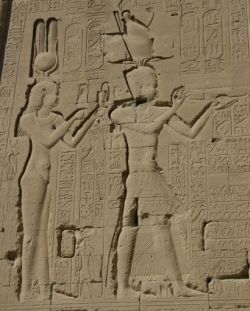Caesarion (Caesario) also known as Ptolemy XV Caesarion (Ptolemaeus XV Philopator Philometor Caesar) was born on June 23, 47 BCE in Egypt. He was the only biological son of Julius Caesar and the Queen of Egypt Cleopatra VII; he was the last pharaoh of Egypt.
His mother insisted that Caesarion was the biological son of Caesar. He was to inherit his appearance and behaviour from the Roman dictator, but the Roman himself did not officially recognize him as his descendant. The son, however, could use his name. Cleopatra herself compared herself and her son to the Egyptian goddess Isis and her son Horus.
The issue of Caesarion’s paternity was extremely controversial when Caesar’s adopted son, Gaius Octavian fell into conflict with Cleopatra. His ally Gaius Oppius wrote a pamphlet to prove that Caesarion was not Caesar’s son.
Caesarion spent two years of his early life, from CE 46 to 44, in Rome, where he and his mother were Caesar’s guests. Cleopatra hoped that after Caesar’s death, Caesarion would become his successor and thus the most important person in Rome and Egypt. After Caesar’s assassination on March 15, 44 BCE mother and son returned to Egypt. From September 2, Caesarion (he was 3 years old) was considered co-ruler of Egypt, alongside his mother, but naturally, he had no influence on the state’s policy.
During a tense period when the decisive conflict was to arise between Mark Antony and Octavian (the future emperor of Rome), Antony shared power in republican Rome with Octavian and Marcus Lepidus, who stayed in 36 BCE forced to withdraw from politics. Thus, there were only two competitors for power on the scene. In 34 BCE Antony guaranteed wide lands in the east and titles to Caesarion and the three children that Cleopatra bore him. Caesarion was proclaimed “god”, “son of God” and “king of kings”. Antony, in order to undermine Octavian’s authority, decided to declare Caesarion the true son of Caesar and his rightful successor (Octavian was only an adopted descendant of Caesar). This declaration, dubbed the Donation of Alexandria, envisaged the separation of the eastern kingdom. Cleopatra was proclaimed queen of Egypt, Cyprus, Africa and Celesyria, co-ruling with her son Caesarion; Alexander Helios was granted Armenia, Media and conquered parts of the Party, Ptolemy – Phenicia, Syria and Cilicia, and Cleopatra Selene – Cyrenaica and Libya. This declaration caused a significant deterioration in relations between the two politicians. Octavian used this situation to gain the support of the Roman people for his actions, which did not accept Antony’s eastern policy, and favour foreign rulers.
After Antony’s defeat in the Battle of Actium in 31 BCE Cleopatra took steps to prepare her son for independent rule. Sam contemplated going into exile with Antony, who believed that he would be able to withdraw from politics like Lepidus. When in 30 BCE Octavian invaded Egypt, Cleopatra sent 17-year-old Caesarion to the Red Sea to the port of Berenike (the present city of Barnis) to protect him from the wrath of the victorious chief. The queen also assumed that it would be easier for him to escape from the Red Sea and take refuge in India.
Octavian on August 1, 30 BCE conquered Alexandria and thus subjugated it to the Roman Republic. Antony committed suicide before conquering the city; on August 12, Cleopatra VII followed in his footsteps.
We do not know the last years of young Caesarion’s life well. The youth’s bodyguards and guardians either betrayed him or succumbed to Octavian’s promises of grace and returned to Egypt. The messages are unclear. Plutarch claims Caesarion reached India, but, having been promised to the throne in Egypt, decided to return.
It is believed that Caesarion was murdered in Alexandria by order of Octavian, who had previously consulted Areios Didymos. Octavian asked the philosopher Areios if he had the right to kill Caesarion. The philosopher, paraphrasing Homer, said: “it is not good to have too many Caesars”1. So he had him strangled at the end of August 30 BCE.


